Seventy seconds isn't a long time, but standing under your posts waiting for the opposition out-half to kick his team to victory, it must have been an awfully lonely place.
Ronan O’Gara and La Rochelle did what many didn’t give them any chance of doing, beating Leinster in a Heineken Champions Cup final.
Of course, it didn’t come from nowhere. La Rochelle have now beaten Leinster twice in two seasons, but you felt that Leo Cullen’s side were on such a high that stopping them seemed unlikely.
Leinster will come in for some criticism with how they managed the game.
They started brightly but faltered with some set-piece combinations and the flow of their attack wasn’t as crisp as what we’re used to seeing.
Their set-piece came under pressure with La Rochelle getting the upper hand in the scrum and both Irish hookers coughed up possession in the lineout, which affected the impact of their attack, something we’re not too used to seeing from a full-strength Leinster team this season.
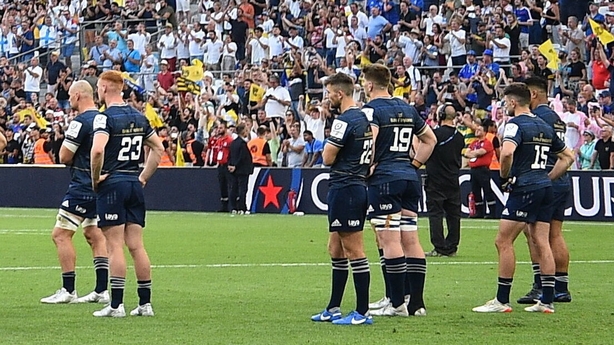
Of course, when you’re in a final against a top class and physically dominant team, then you’re going to face more adversity than your average league game.
However, some of the Leinster passing and fluidity seemed to be a product of their own doing.
The Top 14 side were set up very well in defence.
They imposed themselves and Leinster struggled to find an opening for a try; in fact they didn’t get one at all, which you don’t see very often.
I can’t remember the last time that they didn’t score a try in 80 minutes of rugby.
The United Rugby Championship will also come in for some criticism.
The league isn’t competitive enough, some may argue. Leinster don’t get challenged enough and maybe the other teams aren’t physical enough for the four-in-a-row winners to prepare for a battle against the likes of La Rochelle.
However, I feel that’s a wild misinterpretation of what actually happened.
Of course, Leinster came up against a more physical team than their weekly games in the URC.
But they are also a fiercely physical team themselves, and you could see that they upped their intensity again in defence against La Rochelle.
Normally, the most physical teams make it all the way in these competitions, and the Blues are no different.
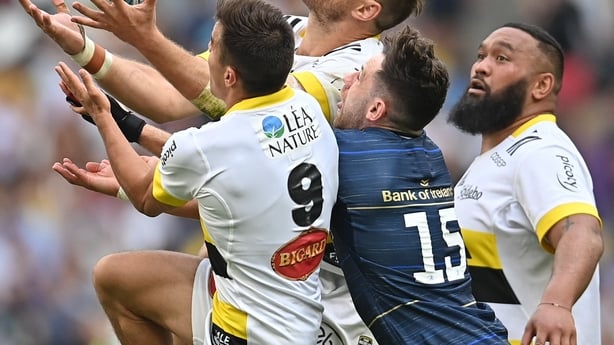
We were probably 70 seconds away from people talking about how the four-time winners have changed their game and are now able for the big French physicality.
Sport is fickle, and one try has changed our whole outlook on the tournament.
Leinster were eight points clear and on the attack in La Rochelle’s half with about 57 minutes played.
Normally, they would create an opportunity at this point to go clear of any danger and would put the game to bed, whether that is through another penalty or a killer blow by scoring a try to deflate the opposition.
However, O’Gara’s side showed their quality and earned themselves a turnover through Wiaan Liebenberg.
Instead of slowing the game, they upped the pace where it suited them and forced Leinster into a cascade of uncharacteristic errors.
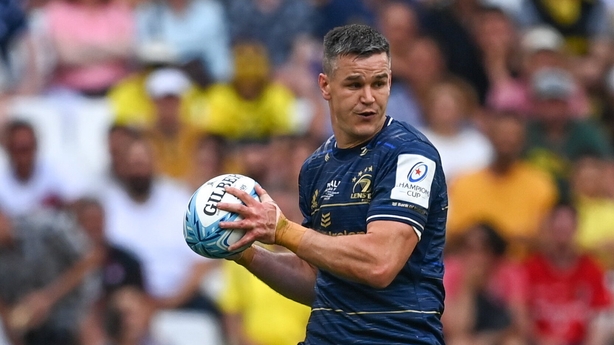
Jimmy O’ Brien failed in his attempt to shepherd the ball over the end goal which resulted in a goal line drop out instead of a scrum back to where the La Rochelle kick took place.
In fairness, Raymond Rhule was chasing hard, and the bounce of the ball went slightly against O’Brien but Leinster were still in full control, asking Wayne Barnes to allow play to continue while four of the La Rochelle contingent were gasping for air or tending to injuries.
We weren’t talking about Leinster losing the physicality battle at this stage.
Stade Rochelais had thrown their biggest forward pack at Leinster to this point and were still eight points behind.
From the resulting restart, Brice Dulin kicked a poor drop goal attempt which bounced out from the end goal area and back into play, forcing Sexton into the decision to play the ball and attempt a dummy kick before presumably attempting to clear his lines.
However, he got caught in the tackle but managed to find Hugo Keenan, who also failed to clear his lines.
La Rochelle won a penalty at the breakdown, kicked to touch and mauled their way over to change the complexion of the game. There was only a point between the teams.
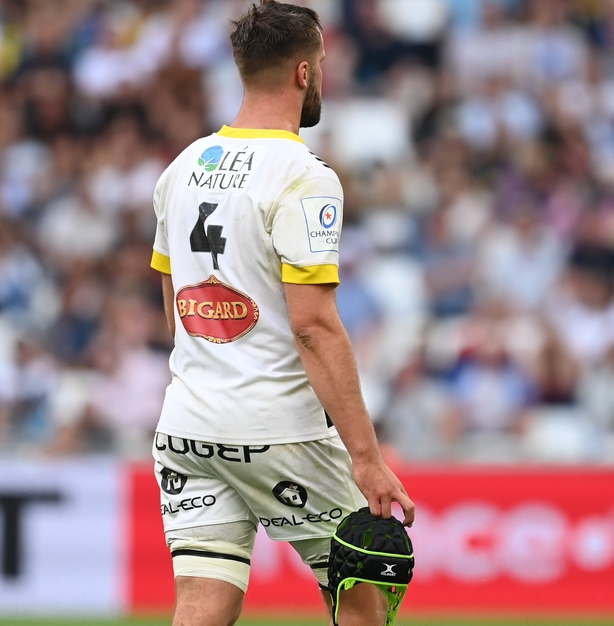
Despite a silly yellow card for Thomas Lavault and a Ross Byrne penalty to give the visitors slightly more breathing room, their game still contained more mistakes than you’d expect from a dominant force like Leinster.
Two handling errors from Byrne gave La Rochelle entries and you’d have to question the management’s decision to replace Sexton.
Maybe they were trying to get ahead of fatigue levels, but this is a guy who is still playing top end international games and asking the referee to continue the game when La Rochelle were slowing it down, Sexton wasn’t.
Other changes were slow to happen, yet Sexton gave way.
For the final ten minutes, La Rochelle held possession and looked after the ball until they scored the all-important try to snatch victory right at the death.
Their physicality helped in winning the gain line for Rhule’s try.
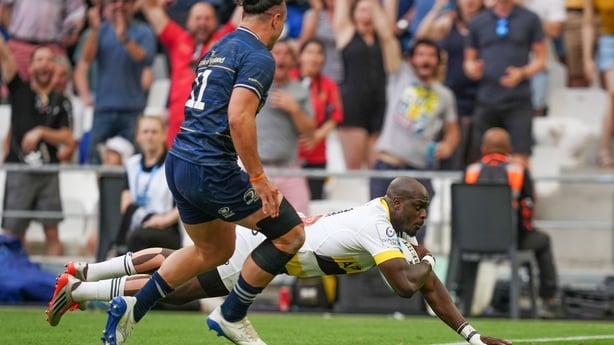
The gain line success and 1.7 second average ruck speed allowed Dillyn Leyds to pick on Tadhg Furlong and get his offload away to Rhule who scorched past Keenan for a try.
Their physicality mattered in the maul to get them back to a one-point game, and it definitely helped when holding on to possession until they found a crack in the Leinster defensive effort for Authur Retiere to sneak his way under Garry Ringrose to win the game.
There’s no doubting that La Rochelle have some enormous players in Will Skelton and Uini tonio, with other players like Jonathan Danty and Levaani Botia in midfield who bring huge levels of physicality in contact.
However, Leinster are more than capable around the pitch and play a physical game with higher skill qualities and game understanding than most.
It’s lazy to assume the loss was merely down to a gulf in physicality.
When Leinster win the breakdown battle we call it tactically astute, but when La Rochelle disrupt the Leinster breakdown it’s assumed that Leinster were physically incapable.
When Leinster hold teams out defensively, it’s a system that has won them the game and not their physicality but when another team stop Leinster from scoring tries then it is physicality that won the battle.
There’s no doubting that this was a step up in physicality, but Leinster will be hurting because of their errors in game management, their handling errors, their set piece errors.
'This one is going to hurt them for a long time' - Kearney
Of course, the opposition will impact their ability to play with the same attacking intent and flow but too much of this was in Leinster’s own control.
It’s a trophy lost for Leinster but O’Gara and his team were full value for their win, and they had the fighting spirit and ruthlessness to go after the four-time champions for the full 80 minutes without dropping their heads.
Putting a new name on the trophy is great for the competition.
The scenes in La Rochelle proved what it meant to the town and the effort that the O’Gara led squad and management put into the tournament made it happen.
The magic of the Champions Cup lives on.
Follow Ulster v Munster (Friday 7.35pm), Leinster v Glasgow (Saturday 3.15pm) via our live blog on rte.ie/sport or on the RTÉ News app. Watch Leinster v Glasgow live on RTÉ2 and RTÉ Player.
Listen to live commentary from Ulster v Munster on RTÉ Radio 1 Extra and updates from Leinster v Glagsow on Saturday Sport on RTÉ Radio 1.


